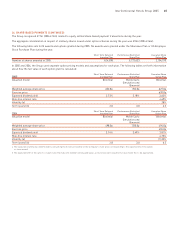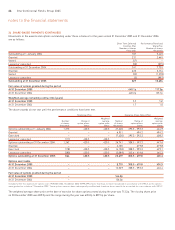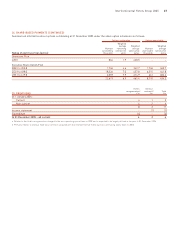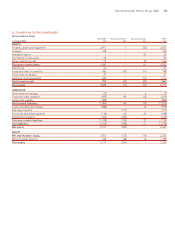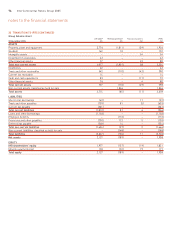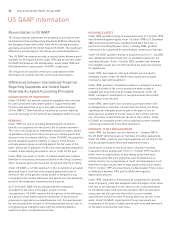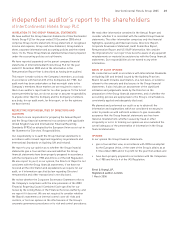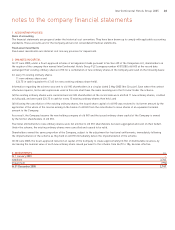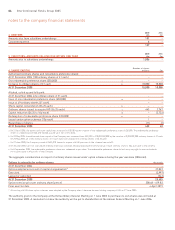Holiday Inn 2005 Annual Report Download - page 77
Download and view the complete annual report
Please find page 77 of the 2005 Holiday Inn annual report below. You can navigate through the pages in the report by either clicking on the pages listed below, or by using the keyword search tool below to find specific information within the annual report.
InterContinental Hotels Group 2005 75
33 TRANSITION TO IFRS (CONTINUED)
Balance sheet remeasurement
Held for sale Under IFRS, assets are classified as held for sale
when their value will be recovered through a sale transaction
rather than continuing use and management consider a sale to
be highly probable.
Assets classified as held for sale are held at the lower of their
carrying value and fair value less cost to sell. No depreciation is
charged on assets held for sale.
Goodwill Under UK GAAP, goodwill is amortised over 20 years.
Under IFRS, goodwill is subject to annual impairment testing
and is not amortised.
Employee benefit obligations Under UK GAAP, scheme assets and
liabilities are not recognised on the Group’s balance sheet. Under
IFRS, any excess or deficit of scheme assets over scheme liabilities
is recorded as an asset or liability, respectively, in the Group’s
balance sheet. Each year, the scheme net assets or liabilities are
adjusted for actuarial gains and losses which are recognised
directly in reserves.
Provisions and other payables Under IFRS, net asset carrying
values have been reduced by the remeasurement of deferred tax,
eliminating the provision for loss on disposal of operations
recognised under UK GAAP.
Deferred tax Under UK GAAP, deferred tax is provided on all timing
differences, subject to certain exceptions. Accordingly, deferred tax
is not provided on revaluation gains and gains rolled over into
replacement assets unless there exists a binding agreement for
sale, nor on unremitted earnings of investments except to the
extent of accrued dividends or where there exists a binding
agreement to distribute earnings. Under IFRS, deferred tax is
recognised on all temporary differences between the tax base and
carrying value of assets and liabilities, including those arising from
revaluation of assets, on gains rolled over into replacement assets
and on remitted earnings of investments where the Group does not
control the timing of distributions.
In addition, IFRS requires the tax base of assets and liabilities to
be determined by management’s current intended use and the
intended manner of realisation of the asset or liability.
Balance sheet reclassifications
Software Under IFRS, software is classified as an intangible asset.
Other intangible assets Under IFRS, amounts paid to hotel owners
to secure management contracts and franchise agreements are
classified as intangible assets.
Other financial assets Under IFRS, long-term receivables are
classified as non-current other financial assets.
Cash and cash equivalents Bank overdrafts repayable on demand
are a component of cash equivalents where the Group has a right
of set off.
Trade and other payables Under IFRS, dividends are recognised
as an appropriation of equity in the period in which they are
approved.
Reclassifications which do not impact net assets but which
increase non-current assets by £7m (2004 opening £11m), reduce
current assets by £18m (2004 opening £32m), current liabilities by
£6m (2004 opening increase by £16m) and non-current liabilities by
£5m (2004 opening £37m) have been made to the balance sheet at
31 December 2004 and 1 January 2004 respectively, as presented in
the 2004 Annual Report and Financial Statements. A reclassification
has also been made of £19m (2004 opening £16m), reducing IHG
shareholders’ equity and increasing minority equity interest, in
respect of dividends to minority shareholders.
Cash flow
The transition from UK GAAP to IFRS has no effect upon reported
cash flows generated by the Group. The IFRS cash flow statement
is presented in a different format from that required under UK
GAAP with cash flows analysed into three categories of activities –
operating activities, investing activities and financing activities.
Adoption of IAS 39
The impact of adopting IAS 39 on 1 January 2005 was to reduce
other financial assets by £4m.
34 PRINCIPAL OPERATING SUBSIDIARY UNDERTAKINGS
InterContinental Hotels Group PLC was the beneficial owner of all
(unless specified) of the equity share capital, either itself or through
subsidiary undertakings, of the following companies during the year:
Six Continents Limited (formerly Six Continents PLC)
InterContinental Hotels Group Services Company
InterContinental Hotels Group (Management Services) Limited
InterContinental Hotels Group Operating Corporation
(incorporated and operates principally in the United States)
Soft Drinks
Britannia Soft Drinks Limited (47.5% Six Continents Investments
Limited, 23.75% Whitbread PLC, 23.75% Allied Domecq PLC, 5%
PepsiCo Holdings Limited) (note a)
Britvic Soft Drinks Limited (100% Britannia Soft Drinks Limited)
Robinsons Soft Drinks Limited (100% Britannia Soft Drinks Limited)
note a The Group exercised dominant influence and controlled Britannia
Soft Drinks Limited up to 14 December 2005 when the Group
disposed of all its interests. Accordingly, the Group’s investment
was treated as a subsidiary undertaking until the date of disposal.
note b Unless stated otherwise, companies are incorporated in Great
Britain, registered in England and Wales and operate principally
within the United Kingdom.
note c The companies listed above include all those which principally affect
the amount of profit and assets of the Group.


